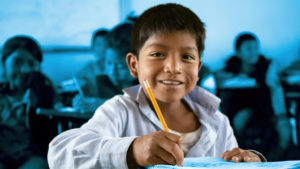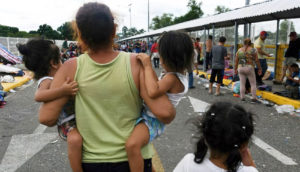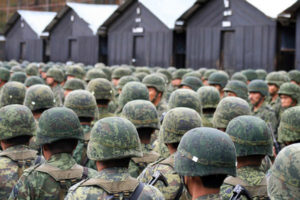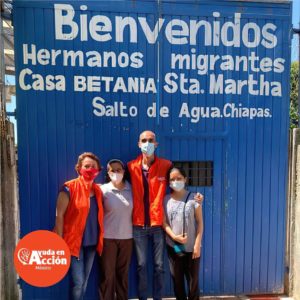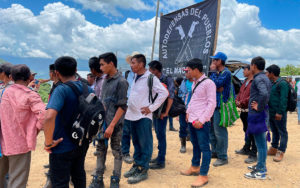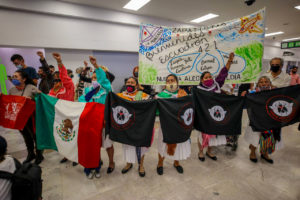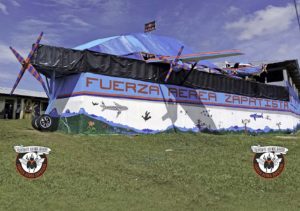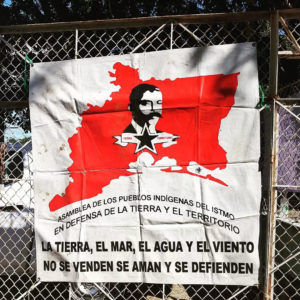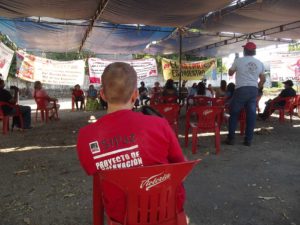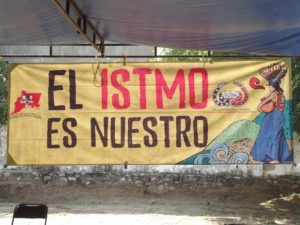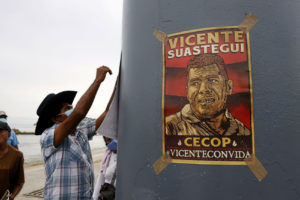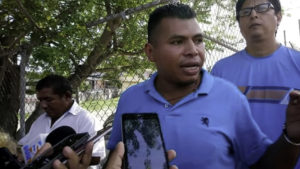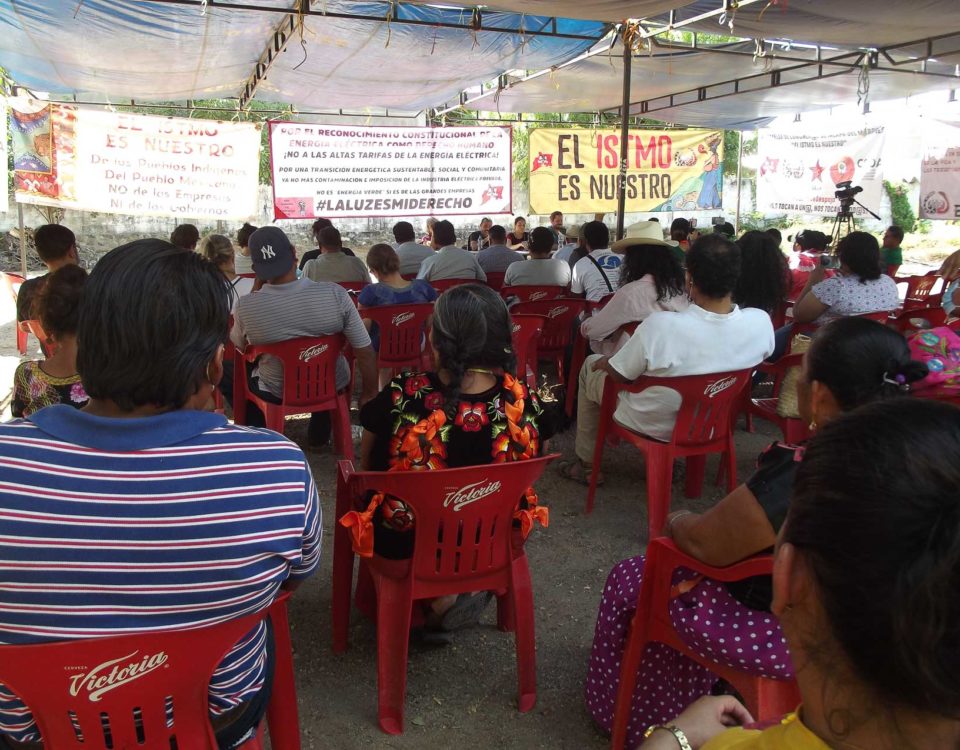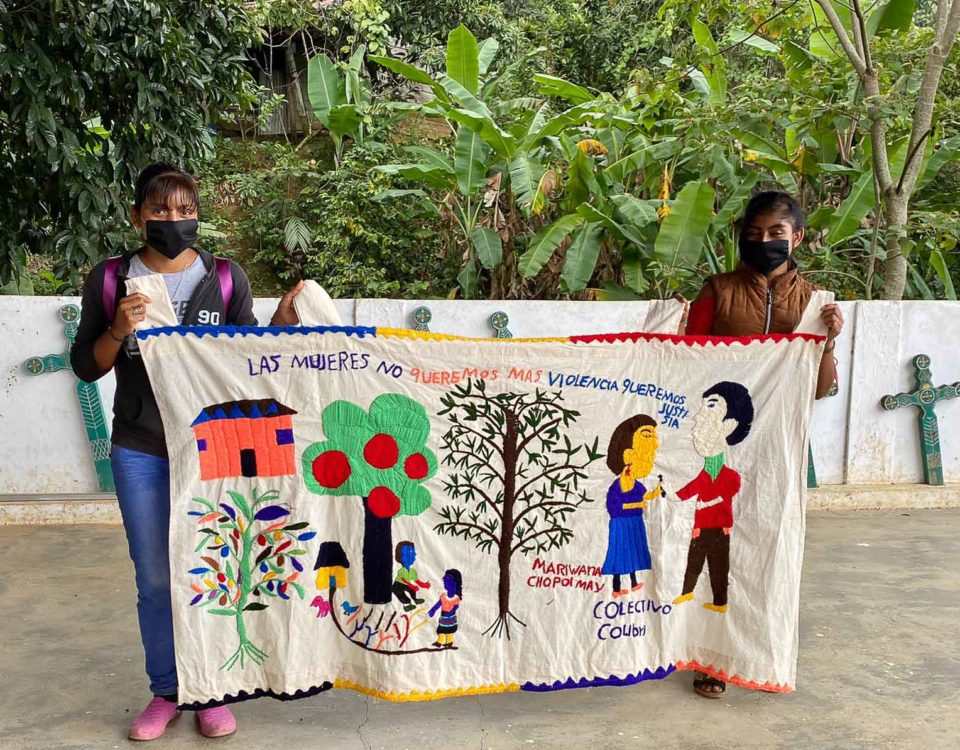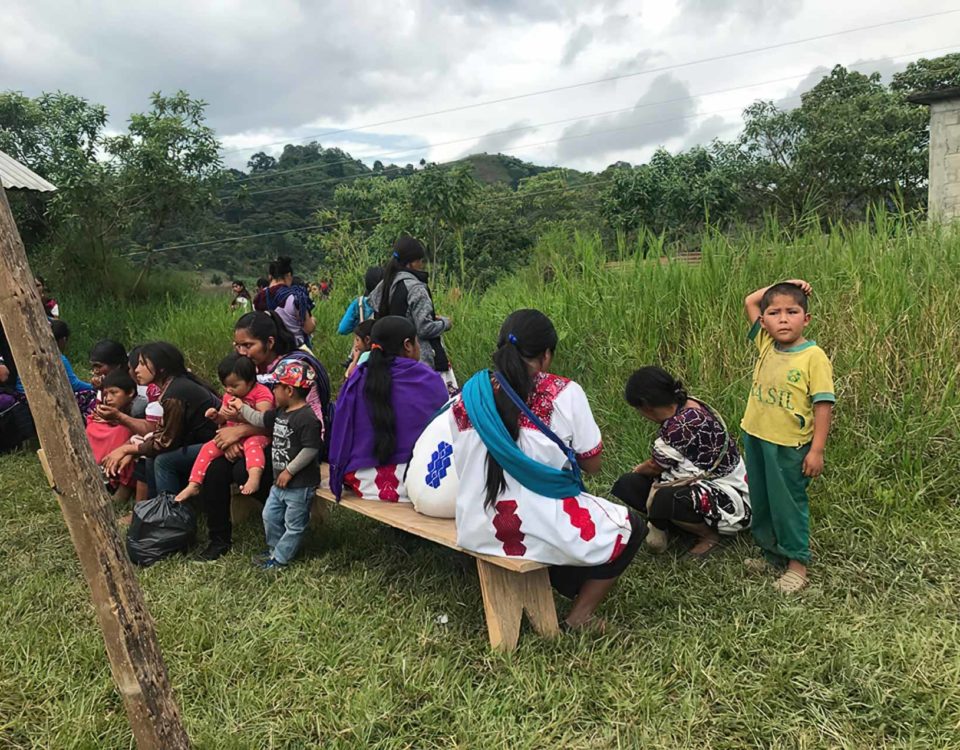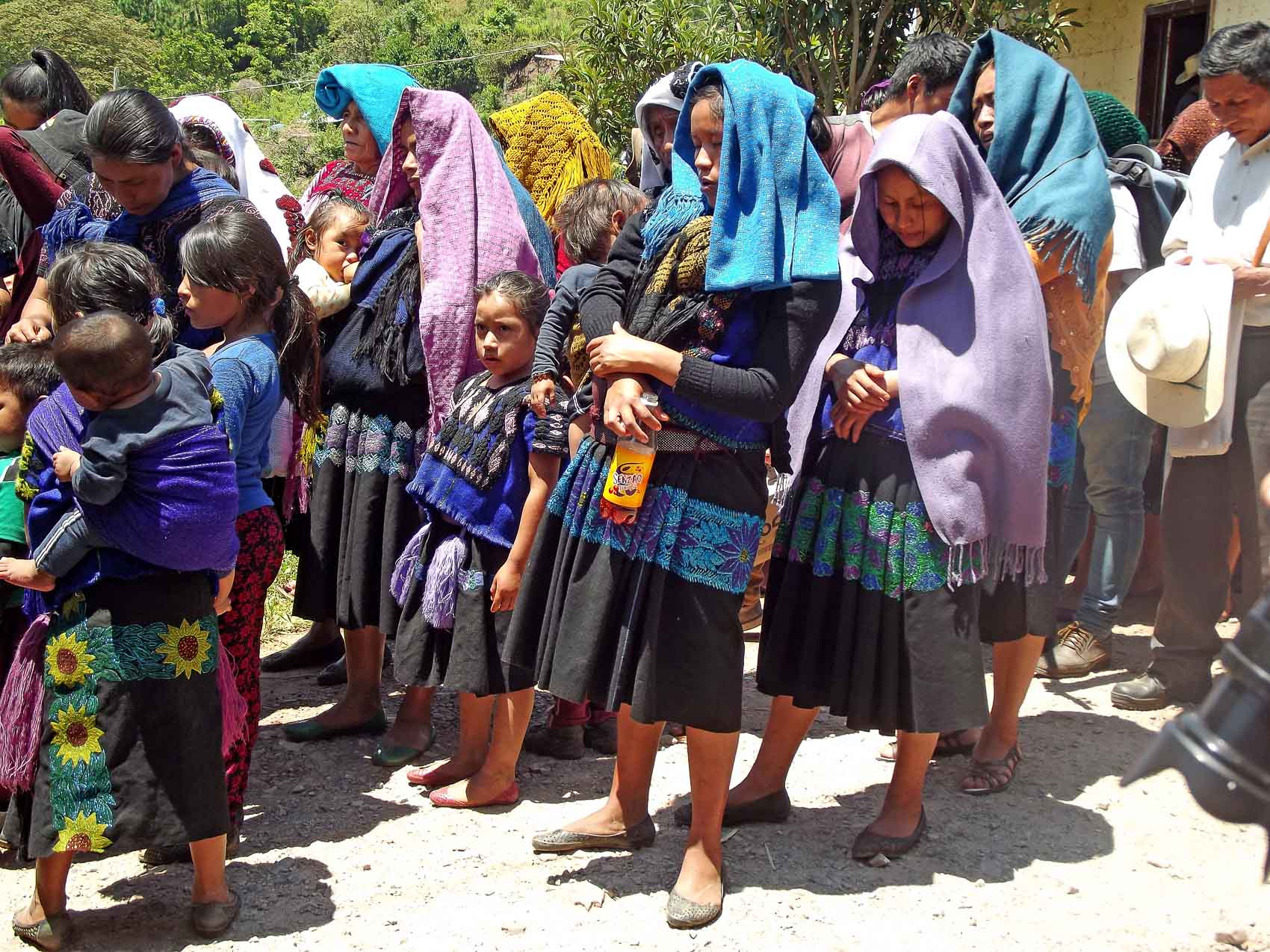
SIPAZ Activities (mid-May to mid-August 2021)
03/10/2021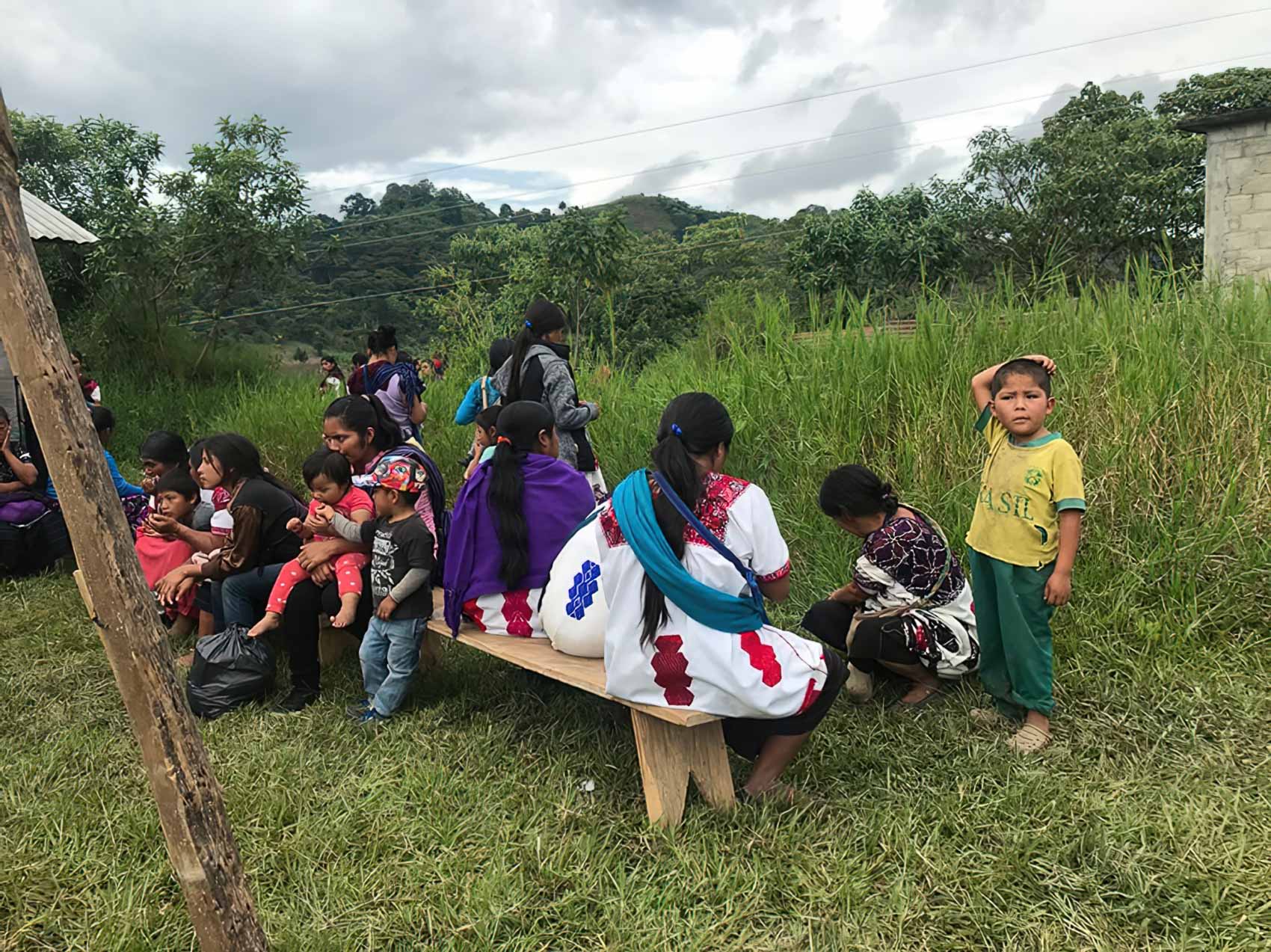
FOCUS: Violence, a high tide on a full moon in Chiapas
08/12/2021
I n September, President Andres Manuel Lopez Obrador (AMLO) presented his third government report in which he addressed the human rights situation. Although he said that in Mexico “human rights are not violated”, several civil organizations contradicted his statements. In its 2020 report, the National Human Rights Commission (CNDH) presented 11,387 complaints of human rights violations, committed by different public institutions. Human Rights Watch (HRW) stressed that with the mobilization of the armed forces for public order tasks, customs control, migration control and management and development of megaprojects, other military abuses have been added. HRW affirmed that, “human rights violations – including torture, forced disappearances, abuses against migrants, extrajudicial executions and attacks against independent journalists and human rights defenders – have continued during the government of Andres Manuel Lopez Obrador.” “Only 1.3% of crimes committed in Mexico are solved”, said the organization Zero Impunity (Impunidad Cero). The Miguel Agustin Pro Juarez Human Rights Center (Centro Prodh) stated: “without a doubt, the federal government has promoted some actions that go in the right direction (…) but from there to affirm that in Mexico violations of human rights have been eradicated there is a distance that goes from truth to falsehood.”
Enforced disappearance: a huge outstanding issue
In commemoration of the International Day of the Victims of Forced Disappearances (August), civil organizations and groups carried out actions to highlight the seriousness of the situation in Mexico and to demand that the authorities guarantee the effective search for disappeared persons. According to the National Search Commission (CNB), the number of missing persons in Mexico has risen to 94,939 from 1964 to November 2021.
On the positive side, in October, a decree was published that created the Commission for Access to Truth and Promotion of Justice for serious human rights violations committed between 1965 and 1990. During this period known as the “Dirty War”, crimes of forced disappearance, torture and extrajudicial executions of people who belonged to movements or organizations that questioned State policies were committed. The Commission will have the purpose of investigating, supervising and issuing reports related to human rights violations during this period.
Defenders, journalists, women and minors: among the most vulnerable sectors
In October, the Interior Ministry announced that so far during the AMLO government, 47 journalists and 94 defenders have been murdered. It reported that, of the murderers of journalists, only five have been sentenced. The states with the highest number of murdered activists are Guerrero, Oaxaca and Chiapas.
In October, civil organizations reported to the Inter-American Commission on Human Rights (IACHR) the repression and stigmatization of feminist demonstrations. They pointed out the “improper use of force, sexual violence, and physical and digital harassment.” The complaints also had to do with restrictive and criminalizing laws of social protest; militarization and the use of force in this context; the violation of the right to assemble peacefully and freedom of expression. In addition, they highlighted the stigmatizing speeches used to discredit the movements. In September, for example, AMLO declared that “Mexican feminism has directly become an opposition movement” to his government.
In August, the Undersecretary for Human Rights and Migration, Alejandro Encinas, presented a study on the impact that the pandemic has had on children. He reported that 5.2 million students did not enroll in school due to causes related to the pandemic or lack of resources. He mentioned the decrease in the proportion of children and young people who entered the school system for the first time. On the other hand, between March and June 2021, historical maximum levels were registered in family violence. “Girls, boys and adolescents suffer from psychological, sexual, physical, economic violence and abandonment or neglect within their homes”, the undersecretary reported. The report shows that during the pandemic there were 273,661 births of babies to teenage mothers; 4,401 homicides of minors between 2018 and 2020; and suicide increased by 12% in this age group.
MIGRATION: “Exodus from Poverty” crosses Mexico
In October, the migrant caravan “for dignity, freedom and peace” began in Chiapas, to “bear witness to the criminalization suffered” by people on the move. More than four thousand migrants made up the contingent, including pregnant women and more than a thousand children, as well as people with a disability.
On the other hand, organizations, networks and collectives from Mexico and Central America launched the #ProtecciónNoContención (#ProtectionNotContention) campaign to put an end to the repression, containment and deportation of people on the move. “In the last three years, the Mexican government has participated with the US government in actions to limit the protection of migrants and asylum seekers, outsourcing the borders of the United States, militarizing Mexican immigration policy and criminalizing those who seek protection”, they stressed. People are forced to leave their countries because conditions that allow them to build a decent life do not exist, they explained. The lack of responses from the immigration and asylum authorities in Mexico have left migrants on the southern border in limbo, mainly from Haiti, Venezuela and Central America, who have remained in that place for more than a year without job opportunities or access to health and education. When they have sought to enter Mexico in search of minimum conditions for a dignified life, they have been repressed and detained by agents of the National Migration Institute (INM) and the National Guard.
MILITARIZATION: continuing concerns
In August, Amnesty International and the Security without War collective reiterated that “it is urgent that the Mexican government stop the participation of the military in public security tasks.” They recalled that militarization has triggered an increase in serious human rights violations. Although the reform proposed by AMLO for the National Guard (GN) to become part of the Secretariat of National Defense (SEDENA) has not yet been approved, “official documents confirm the military dominance that, in fact, already it exists on this police body”, they denounced. Analysts consider that at present, the GN is “made up of 50% of military police from SEDENA, 10% of naval police from the Secretariat of the Navy (SEMAR), 20% of members of the Federal Police, and 17% of new recruits hired by SEDENA and SEMAR, trained in military bases.”
Their participation in migratory operations has been of particular concern since “it has had a serious effect on the safeguarding of the Human Rights of the mobile population.” In this regard, the head of SEDENA, Luis Cresencio Sandoval, declared during his visit to Chiapas in August that the Armed Forces had completed “a series of operational activities” on the southern border that had the participation of more than 14 thousand members. For the period from June 2019 to December 2020, 193,640 migrants were presented to the immigration authority. Specialists estimate that “more than 78 percent of the arrests of migrants in Mexico during this period were carried out by the military or members of the National Guard.”
CHIAPAS: Worsening violence
There have been several moments of violence that have been experienced in Chiapas in the past months (see Focus). In San Cristobal de Las Casas, the Fray Bartolome de Las Casas Center for Human Rights stated that, “daily they report shots with high-caliber weapons, and clashes between armed groups under the permissiveness of the municipal and state authorities.” In October, the journalist and columnist Fredy Lopez Arevalo was assassinated on the street where he lived in this same city.
In October, Dayli de los Santos Herrera Gutierrez was detained, identified as the alleged mastermind of the murder of the indigenous justice prosecutor, Gregorio Perez Gomez, in August, who was in charge of the investigations into the violence in Pantelho. De los Santos and his brother are singled out by El Machete self-defense group as commanders of a “criminal group” called “Los Herrera”, which they blame for at least two hundred homicides committed in Pantelho in collusion with the municipal government of the PRD. In November, the state Congress removed the elected municipal president, Raquel Trujillo Morales (also from the PRD), for having an investigation against him for the murder of a person in July of this year.
In October, the All Rights for All Network (Red TDT) demanded that the attacks against the migrant shelter “Casa Betania Santa Martha” in Salto de Agua cease, after a group of armed people entered the shelter threatening those present. It explained that this is the third time in the year that this type of aggression has occurred and that it occurs in a context where other organizations that defend the human rights of migrants have also been harassed. In mid-September, the Casa del Caminante Jtatic Samuel Ruiz Garcia, located in Palenque, closed its doors due to threats.
At the same time, self-defense groups appeared. The first was El Machete, which was established due to the political and security crisis in Pantelho. The second, called “People of the Jungle”, was revealed in September, when it expressed its support for El Machete. In October, the “Simojovel Armed Forces” appeared demanding, among other things, “1. Respect for our indigenous demands, 2. No more diversion of the people’s resources, 3. We will not allow hitmen or armed drug traffickers.” Also in October, a supposedly self-defense group appeared in Altamirano, where a strong post-electoral conflict was generated to prevent the swearing in of the elected candidate Gabriela Roque Tipacamu, wife of Roberto Pinto Kanter, both accused of wanting to continue with their cacicazgo (since 2002), in this municipality.
Demonstrations and criminalization
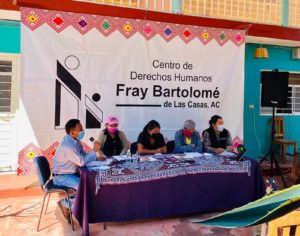
Press conference one year after the arrest of Cesar Hernandez Feliciano and Jose Luis Gutierrez Hernandez in Chilon © SIPAZ
In October, a year after the repression of the protest against the installation of a National Guard barracks in Chilon, relatives and residents demanded the termination of the criminal proceedings against Cesar Hernandez Feliciano and Jose Luis Gutierrez Hernandez. They were arrested for the crime of rioting, after participating in a demonstration against the construction of said barracks, to later be tortured, arbitrarily deprived of liberty and held incommunicado. Their defense has filed a series of legal appeals but all have been dismissed. In addition, it should be remembered that in November 2020, Mayan-Tseltal communities filed an injunction against the construction of the Barracks (since a free, prior and culturally appropriate consultation was not carried out). To date, said injunction remains unresolved.
In October, civil organizations denounced that, for more than ten years, they have carried out different actions to counteract the environmental impact that afflicts the San Cristobal de Las Casas wetlands. They emphasized the omission of the authorities who “are not implementing urgent and effective measures.” They hope that with the entry of the new municipal administration for 2021-2024, “the issue will be put back on the table and taken as the opportunity to do something.”
On November 1st, groups of women and relatives of victims of feminicides held the “March of the Catrinas” in San Cristobal de Las Casas, Comitan and Tuxtla Gutierrez to demand justice and highlight violence against women. The Feminist Observatory against Violence against Women of Chiapas reports that from 2016 to 2020 “there were more than 900 violent deaths of women.” “We have identified the resistance of the Prosecutor’s Office to investigate with a gender perspective, which is essential for clarifying the facts, access to truth and justice”, the protesters concluded.
Aggressions in Zapatista territories while the “Journey for Life” continues
The Zapatista delegation “Squad 421” arrived back in Mexico in September, after visiting several European countries for more than four months, where they exposed their struggle and got to know that of various social and popular groups. It was followed by La Extemporanea air delegation, made up of 177 members as well as a delegation from the National Indigenous Congress (CNI). Between Squad 421 and La Extemporanea (which has not yet returned), the Zapatista itinerary through Europe will encompass some thirty countries.
Meanwhile, in Chiapas, in September, the AJMAQ Resistance and Rebellion Network denounced that members of the Ocosingo Coffee Growers Regional Organization (ORCAO), detained two members of the Good Government Council (JBG) Patria Nueva, municipality of Ocosingo. AJMAG pointed out that “ORCAO has perpetrated a series of criminal actions against the EZLN Support Bases of the Moises Gandhi autonomous community for several months. The most despicable acts being those registered since August 2020, where looting, robbery, destruction and burning of the autonomous cooperative store El Arco Iris was carried out in a violent manner, as well as the kidnapping of Felix Lopez Hernandez on November 8th, 2020 and of two members of the Fray Bartolome de Las Casas Center for Human Rights on April 12th of this year.” It considered that “this escalation of violence orchestrated from the high powers of the federal government occurs during the EZLN initiative Journey for Life Europe Chapter, which seeks to expand, in a peaceful and creative way, the seed of resistance-rebellion for humanity and Mother Earth, that is, for life.”
The EZLN made a statement following the release of the two members of the JBG, pointing out the inaction of the government, which “overlaps and encourages these crimes” and maintains “alliances with drug trafficking that cause indigenous communities to be forced to form self-defense groups” in addition to “promoting and financing paramilitary groups such as those that continually attack communities in Aldama and Santa Martha.” In the communiqué “Chiapas on the Brink of Civil War”, it also spoke of the slowness of the vaccination campaign, the obstruction of the departure of the Zapatista delegation to Europe and the permanence of the same cadres in different political parties, among others.
OAXACA: Aggressions against human rights defenders increase
In August, the Democratic Civic Union of Neighbourhoods and Communities (UCIDEBACC) denounced that its leader, Antonio Zarate Bernal, was kidnapped and later found “with multiple blows and with signs of torture.” It denounced the persistent repression that has been going on for several years and recalled that Antonio Zarate Bernal was arrested in 2011 and released two months later for not verifying the crimes for which he was accused. The arrest would have to do with “the criminalization carried out by the Mexican State (…) which has maliciously used the Mexican justice system to set up cases for prefabricated crimes.”
In September, Jose Castillo Castro, defender of land and territory in the Chontal community of Barra de la Cruz, in the municipality of Santiago Astata, was hospitalized after receiving two shots in an attack carried out by two people who were traveling on a motorcycle. The Center for Human Rights and Advice to Indigenous Peoples (CEDHAPI) demanded that this attack be investigated, noting the increase in attacks on human rights defenders and journalists.
The No to Mining for a Future for All Front denounced that during the mobilization organized in October demanding the cancellation of the San Jose mining project, operated by Fortuna Silver Mines, municipal and agrarian authorities that make up the Front received threats from people who claimed to bring weapons “to remove those from the mobilization” and have the protesters identified. “Our mobilization is peaceful, they abide by the law, within the constitutional framework and in compliance with the agreements of the general assembly to prohibit mining activities”, they recalled.
In November, the Attorney General’s Office issued a “pink alert” for the disappearance of environmentalist Irma Galindo Barrios. The defender of the forests of her Ñuu Savi people was in Mexico City collecting food for communities in the municipality of San Esteban Atatlahuca that were attacked at the end of October by an armed group after denouncing the depredation of their natural resources. The events left one person dead, four missing, dozens of houses burned down and around 300 displaced. The environmentalist had already been the victim of defamation, harassment and threats since 2019.
In November, the Encounter in Defense of Our Natural and Communal Assets The Isthmus Is Ours took place, convened by organizations of the National Indigenous Council in Jalapa de Marquez. Its participants denounced the intensification of violence due to the presence and participation of organized crime in business activities in that region, as well as threats and harassment by companies. They also demanded a halt to criminalization for the defense of the territory against the Tehuantepec Isthmus Interoceanic Corridor.
As for advances, in September the Assembly of Peoples of the Isthmus in Defense of the Land and Territory (APIIDTT) reported on the legal victory of the Zapotec communities against the Gunaa Sicaru wind project of the multinational company Electricite de France (EDF) that involves an investment of six billion pesos and a surface area of 4,700 hectares of leased land. It explained that, in September, a court granted the outright suspension against EDF, which will not be able to carry out any work until the case is resolved. Last year the APIIDTT filed an injunction as the community members have not given their authorization for the construction of the project.
In November, the Supreme Court of Justice of the Nation (SCJN) generally approved the draft judgment in favor of the defense of Los Chimalapas. This event occurs nine years after the government of Oaxaca presented a constitutional case against the creation of the Belisario Dominguez municipality by the government of Chiapas, which involved the invasion of approximately 84 thousand hectares of Oaxacan territory. The National Committee for the Defense and Conservation of Los Chimalapas, considered that this result favors Oaxaca, but in particular the people of Los Chimalapas, who have fought to defend their territory in a conflict that was used by ranchers, loggers and drug traffickers to deforest and invade.
GUERRERO: between violence and poverty
On October 1st, in Guerrero as in other states, several municipalities received their new mayors, many to find themselves with serious problems: lack of water, absence of municipal police, unfinished and poorly done works, unpayable debts, unrest and protests due to unfulfilled commitments, wrote La Montaña Tlachinollan Human Rights Center. Guerrero is one of the states where “the intervention of organized crime became more evident” in the June elections. Through threats to the candidates and/or their families, the criminal groups forced them to give up their intention to govern and in other cases, they imposed a particular candidate, Tlachinollan declared.
Later, President Lopez Obrador made a tour of the state. In the company of the new governor Evelyn Salgado, they visited several communities. “The claim of the indigenous and Afro-Mexican communities revolves around the axes of the basis for a decent life: health, education, housing, roads and reactivation of the countryside”, said Tlachinollan. The serious problem of violence was also present: the proliferation of armed groups and the lack of access to justice for women victims of violence. Tlachinollan recognized that, despite the programs implemented by the federal government, the families of La Montaña “have not been able to cross the threshold of extreme poverty” and that this visit generated many expectations when both leaders “took on the commitment to prioritize the poor regions and states.” However, it said that, at the municipal level, interests are different, in particular due to corruption and the mismanagement of resources which they use “as their own patrimony.”
Another problem linked to violence in the state has been forced displacement. Since September, a commission of displaced families from the municipalities of Leonardo Bravo and Zitlala, have been in a sit-in outside the Ministry of the Interior in Mexico City to demand compliance with commitments made in April in an inter-institutional meeting where the National Commission Human Rights (CNDH), promised that, in coordination with the Executive Commission for Attention to Federal Victims (CEAV), it would recognize the status of victims of displaced families; and the Government personnel promised to find safe places for their relocation due to the impossibility of return. So far, no progress has been made on any of these fronts.
Regarding impunity, on the occasion of the seventh anniversary of the disappearance of the students of the Ayotzinapa Normal Rural School in Iguala, activities were organized to demand justice and truth. Relatives of the student teachers criticized “the reluctance” of the government in the investigation, and “the slowness” of the Prosecutor’s Office. This is due to the forty arrest warrants that have not yet been executed and the lack of investigation against members of the 27th Infantry Battalion for their alleged participation. The UNHCHR said that “relevant progress has been made” but that it is “of utmost importance to transform the progress made into concrete actions that aim to break the pact of silence (…) to know the truth of what happened.”
In October, two months after the disappearance of Vicente Suastegui Muñoz, brother of the opposition leader to the La Parota hydroelectric dam, Tlachinollan said that there is no progress in the case despite having identified the people who participated in his disappearance. It stated that formal complaints have been made against such persons; in addition to filing a complaint against the state police and the Navy, “because days before his disappearance he was deprived of his liberty on the grounds that he carried weapons without a permit.” Despite this and the search sessions, the Guerrero General Prosecutor’s Office does not act with “the full force of the institutions.” Acapulco and Iguala are experiencing a security crisis where the authorities have not “acted to dismantle the criminal structure.”

